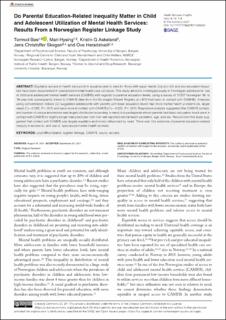Do Parental Education-Related Inequality Matter in Child and Adolescent Utilization of Mental Health Services: Results From a Norwegian Register Linkage Study
Journal article, Peer reviewed
Published version

Åpne
Permanent lenke
https://hdl.handle.net/11250/2941555Utgivelsesdato
2021Metadata
Vis full innførselSamlinger
- Department of Psychosocial Science [862]
- Registrations from Cristin [10402]
Sammendrag
Equitable access to health care point to equal access to care for those with equal needs, but pro-rich and pro-educated inequities have been documented in specialized mental health care utilization. This study aimed to investigate equity in Norwegian adolescents’ use of child and adolescent mental health services (CAMHS) with regards to parental education levels, using a survey of 10 257 Norwegian 16- to 19-year-olds subsequently linked to CAMHS data from the Norwegian Patient Registry (n = 970 had been in contact with CAMHS). Analyses using concentration indices (C) suggested adolescents with parents with lower education levels had more mental health problems (ie, larger need; C = −0.032, P < .001) and were more in contact with CAMHS (C = −0.025, P < .001). Regression analysis suggested that CAMHS contact, and number of unique admissions was largely distributed according to need, but participants whose parents had basic education levels were in contact with CAMHS for slightly longer than predicted from their self-reported mental health problems, age, and sex. Results from this study suggested that contact with CAMHS was largely equitable and mostly influenced by need. There was little evidence of parental education-related inequity in access to, and use of, specialized mental health services.
